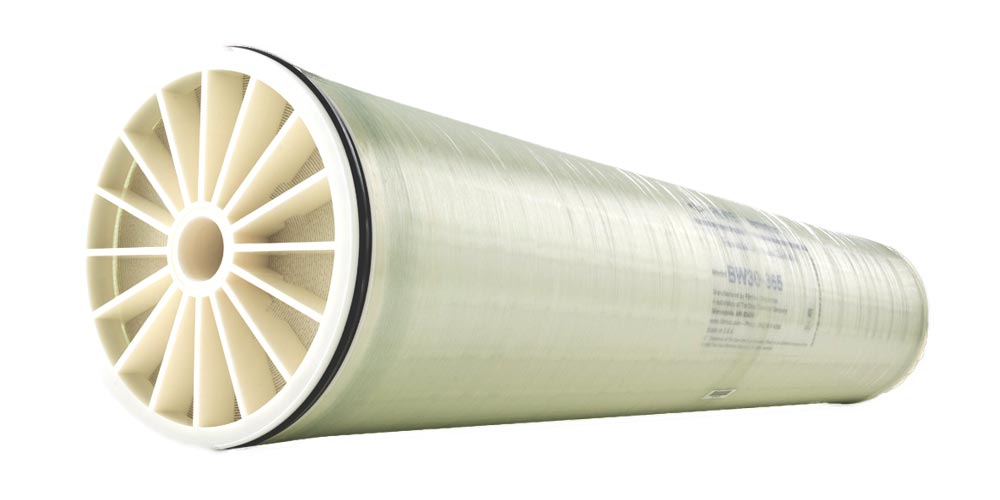DOW FILMTEC ECO elements offer unparalleled rejection and flow performance for your industrial water needs, enabling lower energy usage and reduced regeneration costs in downstream polishing units. With a new industry-leading performance of 99.7 percent rejection at 150 psi, DOW ECO elements provide robust performance over a longer element life. At highest quality, the elements deliver 40 percent lower salt passage at 30 percent less energy, when compared to standard RO elements - an ecological and economic win.
Advantages
- Highest rejection for the highest quality permeate, 40% better compared to industry standard membranes
- Thicker, optimized low dP feed spacer increases fouling resistance and cleanability, and reduces energy lost due to pressure drop
- 30% lower energy than typical high rejection brackish water elements
- Improved fouling resistant membrane sheet to allow sustainable operation and lower downtime for best operation in challenging waters with high biological and organic fouling
- iLEC interconnecting end cap for long term system reliability
Important Information
Proper start-up of reverse osmosis water treatment systems is essential to prepare the membranes for operating service and to prevent membrane damage due to overfeeding or hydraulic shock. Following the proper start-up sequence also helps ensure that system operating parameters conform to design specifications so that system water quality and productivity goals can be achieved.
Before initiating system start-up procedures, membrane pretreatment, loading of the membrane elements, instrument calibration and other system checks should be completed.
Please refer to the application information literature entitled “Start-Up Sequence” (Form No. 609-02077) for more information.
Operation Guidelines
Avoid any abrupt pressure or cross-flow variations on the spiral elements during start-up, shutdown, cleaning or other sequences to prevent possible membrane damage. During start-up, a gradual change from a standstill to operating state is recommended as follows:
- Feed pressure should be increased gradually over a 30-60 second time frame.
- Cross-flow velocity at set operating point should be achieved gradually over 15-20 seconds.
- Permeate obtained from first hour of operation should be discarded.
General Information
- Keep elements moist at all times after initial wetting.
- If operating limits and guidelines given in this bulletin are not strictly followed, the limited warranty will be null and void.
- To prevent biological growth during prolonged system shutdowns, it is recommended that membrane elements be immersed in a preservative solution.
- The Customer is fully responsible for the effects of incompatible chemicals and lubricants on elements.
- Maximum pressure drops are 15 psi (1.0 bar) per element or 50 psi (3.4 bar) per multi element pressure vessel (housing) which ever value is more limiting.
- Avoid static permeate-side backpressure at all times.
Specification
| Product | Part Number | Active area | Feed spacer thickness (mil) | Permeate flow rate | Typical Stabilized salt rejection (%) |
Minimum salt rejection (%) |
||
|---|---|---|---|---|---|---|---|---|
| ft2 | (m2) | gpd | (m3/d) | |||||
| ECO-400i | 11026673 | 400 | (37) | 34-LDP | 11,500 | (44) | 99.7 | 99.5 |
| ECO-440i | 11026679 | 440 | (41.2) | 28-LDP | 12,650 | (48) | 99.7 | 99.5 |
| ECO-500i | 11031767 | 500 | (46.5) | 23-LDP | 14,375 | (54) | 99.7 | 99.5 |
Operating Limits
- Membrane Type Polyamide Thin-Film Composite
- Maximum Operating Temperature 113°F (45°C)
- Maximum Operating Pressure 600 psig (41 bar)
- Maximum Pressure Drop 15 psig (1.0 bar)
- pH Range, Continuous Operation 2 - 11
- pH Range, Short-Term Cleaning (30 min.) 1 - 13
- Maximum Feed Silt Density Index SDI 5
- Free Chlorine Tolerance <0.1 ppm
- Industrial water demineralization
- Water reuse
-
Best price
We never had to wait...always in stock. Thank you for the quality membrane!
 ENGLISH
ENGLISH
 ESPAÑOL
ESPAÑOL العربية
العربية PORTUGUÉS
PORTUGUÉS FRANÇAIS
FRANÇAIS










